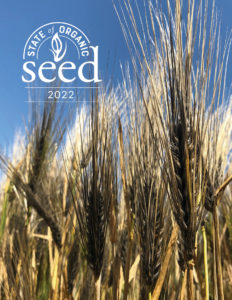
In March, OSA released our most recent State of Organic Seed (SOS) report, an ongoing project to monitor organic seed systems in the U.S. Every five years, SOS serves as a progress report and action plan for increasing the organic seed supply while fostering seed grower networks and policies that aim to decentralize power and ownership in seed systems.
We’re pleased to share additional resources to accompany the report, including data briefs summarizing report findings and recommendations based on roles in the sector. These data briefs are available for download (opens to PDF):
- Organic Seed Producers & Companies
- Organic Plant Breeders & Researchers
- Organic Regulators & Certifiers
- Organic Producers
We also invite you to learn about report findings and recommendations in this webinar hosted by eOrganic. OSA’s Kiki Hubbard and Jared Zystro cover:
- Trends in how much organic seed is being planted in the U.S.
- Barriers to growing the organic seed supply
- Challenges in enforcing the organic seed regulation
- Organic seed production challenges and needs
- Organic seed producer networks
- Investments in organic plant breeding and organic seed research
- Perspectives on intellectual property rights (IPR)
- Perspectives on climate change
- Organic seed policy solutions
Special thanks to the USDA’s National Institute of Food and Agriculture for awarding Organic Farming Research Foundation (OFRF) and OSA an Organic Agriculture Research and Extension Initiative (OREI) grant to support our respective reports: the National Organic Research Agenda (NORA) and the State of Organic Seed (SOS).
